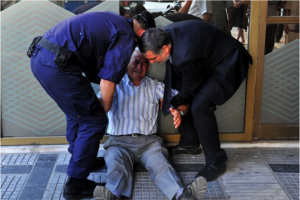By Alexis Comninos, graduate student of human rights at Columbia University
___________________________________________________________________________
This past weekend has been decisive for the future of Greece—perhaps, as some say, the most important few days in the country’s recent history. Through the Greek deal, this weekend saw the EU define its take on human rights, and the result isn’t pretty. Waking up this Monday morning is the closest I have felt to a terrible hangover (it’s not that I don’t drink, I just don’t get hangovers—call it my superpower). I do not just say this as a Greek citizen, but simply as a socially minded individual, someone who until this morning still had faith in the European project.

The outcome of this weekend’s negotiations has struck a huge blow to all hopes of meaningful, sustainable recovery for Greece. It has also irreversibly damaged the idea of Europe, the possibility of the EU ever becoming more than an exploitative project driven by the ideology of a few in Brussels, Frankfurt and Berlin.
Since yesterday evening, the Twitter hashtag #ThisIsACoup has been trending in Greece, Germany, and the United Kingdom. In those twelve characters are captured the frustrations of a number of Europeans who like me believed—somehow—in these institutions.
On Sunday July 5th, the Greek people voted in a bailout referendum. Voters were asked whether the Tsipras government should accept the terms presented by the country’s creditors (aka the troika) for another bailout, terms that were deemed wildly unrealistic, counterproductive, and dangerous by some of the world’s leading economists, including Joseph Stiglitz, Jeffrey Sachs, Thomas Picketty, Amartya Sen, and Paul Krugman. Just over 61% of Greeks rejected the terms put forward by the troika, thus sending a clear message to Brussels and giving Greek PM Alexis Tsipras a renewed mandate to negotiate. And yet, at the end of last week, after days of relentless negotiation, Tsipras presented what appeared to be a complete capitulation, a bailout plan almost identical to the one that had been rejected by his people, the one that he had so vehemently opposed just a few days before.
Consistently, I have felt that most human rights organisations are turning away from the crucial issue of austerity in Greece. Why has so little been written about the human rights consequences of the successive austerity measures, in a country where banks have been closed for over two weeks, where daily cash withdrawals are capped at 60 euros and where there have been talks of sending cargo planes with humanitarian aid? This morning, again, HRW is condemning the treatment of migrants on the Greek Islands, as well as the lack of EU support in managing that crisis. All fights worth fighting; all important issues to which attention should be drawn. But how can these two issues not be connected? How can nothing be written on the austerity packages and enormous budget cuts to come? For these budget cuts will—also—affect the situation of the thousands of migrants stranded on the Greek Islands, as well as put thousands of Greeks out of work and cut down pensions for the most disadvantaged—and this in a country where the unemployment rate is at 25.6%, where just under half of under 25s are unemployed, and where the suicide rate is skyrocketing, having spiked by 35% in two years.

The common argument presented to refute my view is that economic and social rights are really just aspirations, harder to enforce and harder to advocate for. But even if we were to agree with that—and I know that I don’t—what about the utter lack of democracy in this entire process, what about the right to vote, to have a say in your country’s future, if your voice is simply discarded by institutions you have not elected?
In November 2014, the International Federation for Human Rights (FIDH) published a report entitled ‘Downgrading rights: the cost of austerity in Greece,’ in which austerity measures are linked to the deterioration of the right to health and the right to work. And while such a contribution should be commended, human rights—both ESCR and CPR—have mostly been side-lined, if not ignored throughout the negotiations. Austerity is about human rights, and thinking of it as such should not be optional. What has prevented us from seeing the imposed austerity measures as what they are: a violation of the most fundamental human rights?
As Paul Krugman put it in the New York Times, the demands on Greece go “beyond harsh into pure vindictiveness, [leading to the] complete destruction of national sovereignty [with] no hope of relief.” With Monday morning’s agreement, Greece has been thrown on the floor, handed a loaded handgun and forced to pull the trigger. By pulling that trigger it will quite probably take Europe down with it. When saying that, I am not suggesting some kind of apocalyptical scenario in which all of Europe collapses; rather, I am referring to the idea of Europe. The idea of a Europe that is not limited to an unequal free market without any fiscal coordination, a Europe based on solidarity that doesn’t build fences or deploy military forces to prevent refugees from finding shelter on its land, a Europe that is democratic and whose fate is not decided by an unofficial group of finance ministers with no defined mandate.
When asked whether the deal struck with Greece was too harsh and humiliating for Greece, European Commission President Jean-Claude Juncker declared: “I don’t think that the Greek people have been humiliated and I don’t think the other Europeans were losing their face. It’s a typical European arrangement.” That is precisely the problem: that the deal we have just seen is ‘typical’ of today’s Europe.
Alexis Comninos is an M.A. candidate at the Institute for the Study of Human Rights at Columbia University. His research mostly focuses on the intersection of human rights and humanitarianism.
